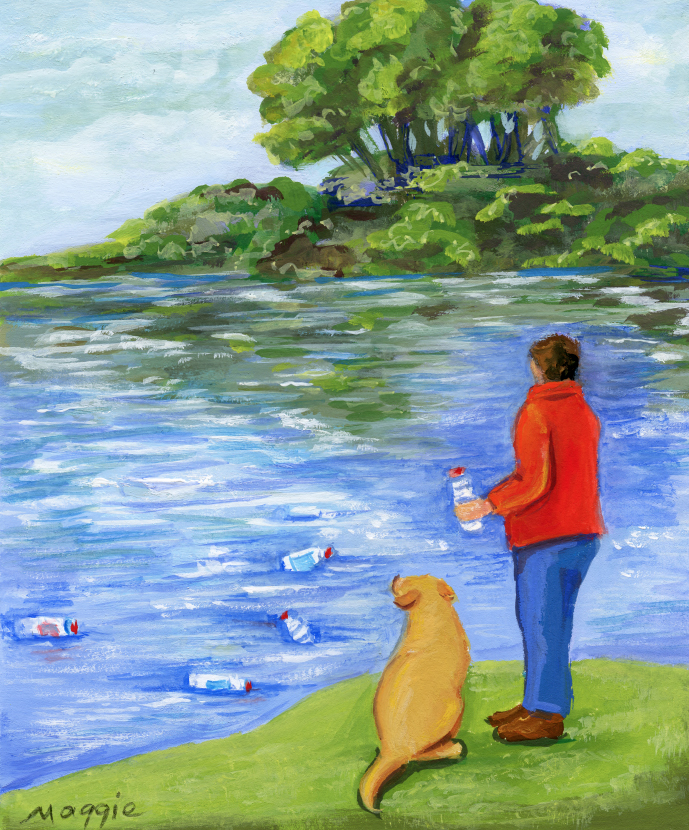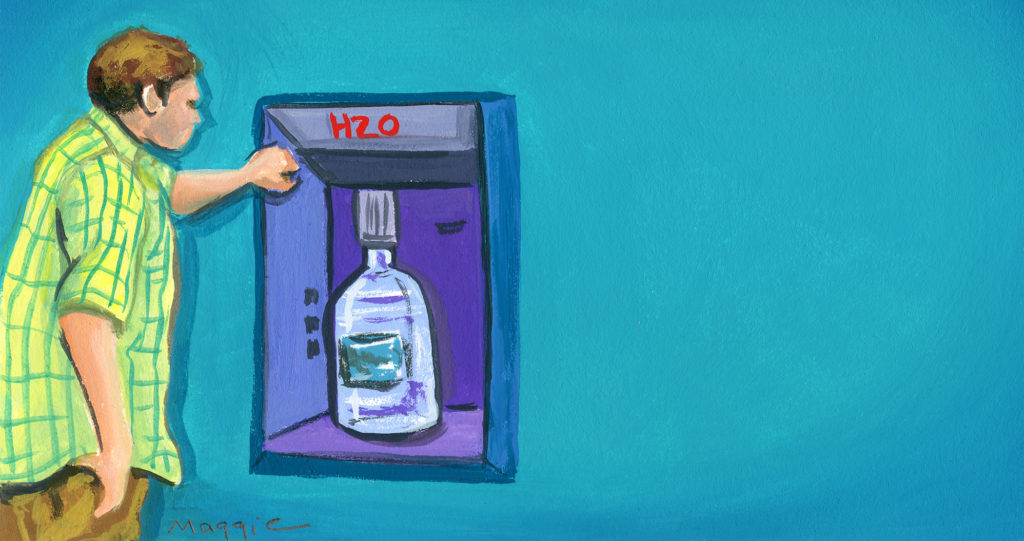Floridians live surrounded by and atop some of the world’s most prolific springs. So what is the safest, yet still environmentally friendly source of drinking water?
When it comes to a long, cool drink of water (and no…I’m not talking about Liam Hemsworth) it pays to be discriminating. Whether your drinking water comes straight from the tap or you purchase it from a vendor, is it safe to drink and is the source environmentally friendly?
Many health-conscious Americans are searching for alternatives to unfiltered tap water. For some, it may simply be a taste preference and, for others, it may be a concern for exactly what extraneous materials might be ending up in their glass. The water that flows from your tap almost exclusively comes from one of two sources: municipal water systems or private wells. Both of these sources are supplied by surface water (springs, lakes or rivers) or groundwater (the Floridan Aquifer), and each is susceptible to contamination.
The Watery Choices
If you choose to forgo tap water altogether and opt for store-bought or home-delivered bottled water, there are several factors to consider. As was revealed recently when Nestlé Waters North America sought to withdraw more than 1 million gallons of water per day from Ginnie Springs in nearby Gilchrist County, there are many controversial environmental issues that must be addressed when choosing this alternative.

Many local residents and environmentalists argue that pumping this much water from the spring will deplete aquifer levels and damage the delicate ecosystem along the Santa Fe River. Others are opposed to the idea because Nestlé will pay nothing for water being pumped locally from Florida’s aquifer and then sell it for profit around the globe. It’s argued that free water packaged for the retail drink market does not lend itself to conservation efforts.
“It’s a waste of resources and overly expensive to buy bottled water,” says John Dunn, Ocala resident and author of Drying Up: The Fresh Water Crisis in Florida, “if you’re served by a utility that provides cheap, clean, safe water. But that assumption may not hold true in the rural parts of Marion County and elsewhere in North Florida, where people have their own wells. They, just like bottling companies, pump water from the aquifer and don’t pay a nickel for it. They only pay a small amount for their permits, which the water management districts pass out freely like library cards. If we all had to pay a true cost of water, we might change our attitudes toward water.”
Dunn, who is slated to be a guest speaker in the Institute for Human & Machine Cognition (IHMC) lecture series in the fall, feels that “no-cost” water surely encourages waste on all fronts at a time when conservation is paramount. Environmentalists point out that excessive water pumping could possibly lead to increased sinkhole activity, the loss of spring-fed lakes, loss of habitat for area wildlife and an aquifer so depleted that drinking water will have to be supplied from the coast through desalinated ocean water.
In addition to water conservation, when choosing individually packaged store-bought bottles of water, the plastic container has become a distinct environmental concern. According to research statistics, almost 1.1 million plastic bottles are bought worldwide every minute of every day. Only 20 percent of that number ends up in the recycle bin, but even more startling is that more than 300,000 plastic bottles are disposed of outside of a landfill every minute. Many of these bottles are thrown into rivers, lakes, oceans, by roadsides, in the woods…anywhere they can be conveniently “disposed of.” According to a report prepared by the Ellen MacArthur Foundation, by the year 2050 the world’s oceans will contain, by weight, more wayward plastic than fish.
“I loved the convenience of buying individual bottles of water, but after months of throwing countless plastic bottles into the garbage, my conscience got the best of me,” says Anna Miller. “I read an article that said most plastic water bottles aren’t recycled, so I quit buying them. My husband agreed and he put in an under-sink filter. We both have our own personal permanent water bottles for when we’re out.”
Miller says she and her husband have a home in Maryland and travel the country extensively.
“Everybody talks about recycling everywhere we go, but the numbers don’t back up what we hear,” Miller notes. “It just doesn’t happen, and even if you buy bottled water and do recycle, just supporting the industry aids all those who don’t. Talk’s cheap, but there’s a cost we’ll all pay one day.”
Most Common Home Filtration Alternatives
If you do choose to pass on vendor-supplied sources, that leaves tap water as your next viable alternative. As Dunn says, municipal systems are excellent sources of fresh water, and private wells can be also. However, either type of system can be contaminated with particulates such as sand or iron, chemicals, microbes or gases. Most of these are usually filtered out in municipal systems, but some people don’t care for the taste of treated water. If, like the Millers, you choose to filter tap water, which filtration system is right for you? And what is the first step in making sure you get clean, pure water to your home?
You can start by having your water tested. The Florida Department of Health in Marion County no longer tests water but can put you in contact with several private companies that do so.
Testing may help pinpoint the type of filtration system you need, or if tests come back OK but you simply want the peace of mind that comes with filtering your drinking water, search for the filtration system that best fits your needs. Here are a few of the most effective types of point of use filtration systems. No one water filtration method will remove all contaminants, and you may have to combine methods to attain the level of purity you seek.
•Pitchers – The most convenient and inexpensive choice for up to one gallon of filtered water. This is an excellent choice to filter out chemical tastes.
•Faucet-mounted – Filters water for drinking, washing dishes and cooking.
•On counter – Filters out some particulates, chemical tastes and some odors.
•Under sink – Installation may require some plumbing skills but can combine several filtration methods for more extensive filtering.
•Whole-house – This is a complete system for filtering not only drinking water but also water used in bathrooms and for laundry. Some systems can be pricey but can be very efficient in filtering out dangerous toxins found in some private wells.
Environmentalists and conservationists, such as Dunn, urge everyone to consider the implications of their choices when it comes to choosing their source of fresh drinking water. With the health of the springs and aquifer so close to Marion County in mind, you can choose the purest source and also the one most environmentally friendly.
Consider the Source
Ever wonder where the water in a water-vending machine comes from? It almost exclusively comes from your local municipal water system.  According to which machine you choose to use, the water entering the machine goes through several different layers of the filtration, usually ending with a blast of ultraviolet light to kill any remaining bacteria that might have survived. But even vending machine filtration systems aren’t foolproof; one California study showed that one-third of all samples taken did not meet state standards for water safety.
According to which machine you choose to use, the water entering the machine goes through several different layers of the filtration, usually ending with a blast of ultraviolet light to kill any remaining bacteria that might have survived. But even vending machine filtration systems aren’t foolproof; one California study showed that one-third of all samples taken did not meet state standards for water safety.
For more information, some local resources are: www.marionsoilandwater.org and www.ocalafl.org/government/city-departments/water-resources/water-conservation






